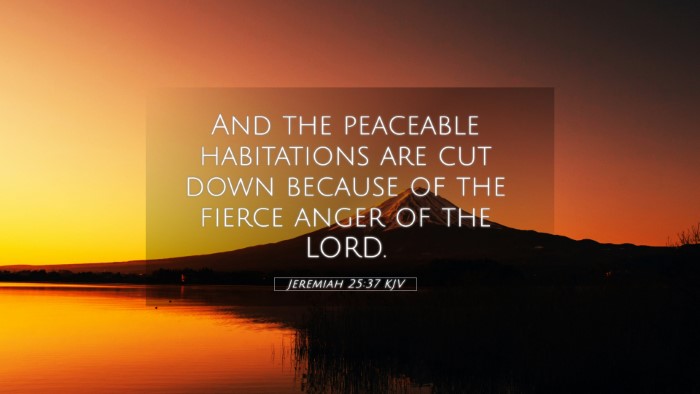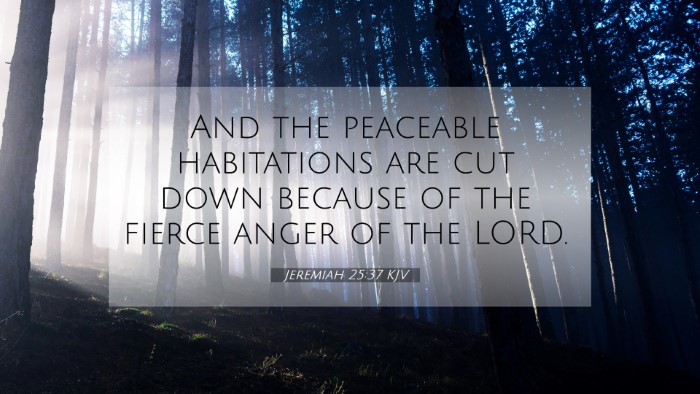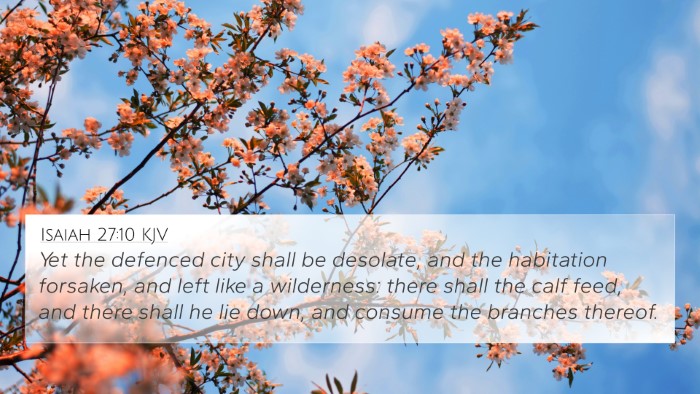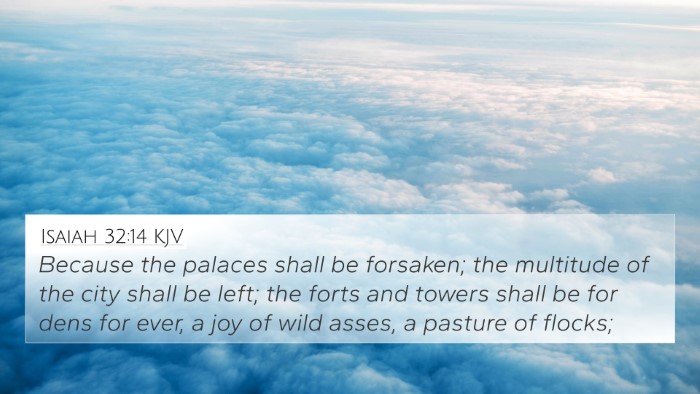Understanding Jeremiah 25:37
Jeremiah 25:37 states: "And the peaceable habitations are cut down because of the fierce anger of the Lord." This verse encapsulates the themes of divine judgment, the consequences of human actions, and the serious nature of God’s prophecies through His prophet Jeremiah. The prophet speaks of the devastation that comes as a result of the Lord's anger towards His people who have turned away from Him.
Summary of Insights from Public Domain Commentaries
The insights drawn from various commentaries shed light on the implications of this verse:
- Matthew Henry: Henry emphasizes the severity of God's judgment and stresses that even peaceful places are not exempt from divine wrath. He interprets this verse as a warning against complacency in a time of spiritual decline.
- Albert Barnes: Barnes notes the connection between God’s anger and the actions of the people. He draws a parallel between the peaceable habitations that are destroyed and the moral and spiritual fabric of society that is being torn apart due to sin.
- Adam Clarke: Clarke elaborates on the historical context, pointing out that the destruction was not just physical but also spiritual, indicating the failure of the people to uphold their covenant with God. He also connects this to the broader narrative of God’s relationship with Israel.
Key Themes in Jeremiah 25:37
The verse conveys several significant themes:
- Divine Judgment: It highlights God’s response to human sin and rebellion, marking His displeasure.
- Desolation: The “peaceable habitations” symbolize safety and security, which are taken away in consequence of the people's actions.
- Warning and Prophecy: Jeremiah serves as a prophetic voice, warning people of the impending doom if they do not repent.
Bible Verse Cross-References
This verse relates to several other scriptures, providing a deeper insight into its meaning:
- Isaiah 9:19: "Through the wrath of the LORD of hosts is the land darkened..." - This verse echoes the idea of destruction due to divine anger.
- Jeremiah 4:7: "The lion is come up from his thicket..." - Symbolizes God's judgment coming upon the land.
- Ezekiel 30:3: "For the day is near, even the day of the LORD is near..." - Speaks of the impending judgment similar to Jeremiah’s warnings.
- Amos 3:2: "You only have I known of all the families of the earth..." - Highlights the unique relationship between God and Israel, thus the seriousness of their sin.
- Zephaniah 1:15: "That day is a day of wrath..." - A proclamation of similar themes of God’s fierce anger.
- Matthew 24:2: "There shall not be left here one stone upon another..." - Jesus refers to the destruction of Jerusalem, linking it back to prior warnings from the prophets.
- Lamentations 3:43: "Thou hast covered with anger, and persecuted us..." - Reflects a similar sentiment of experiencing the results of divine wrath.
Thematic Bible Verse Connections
This verse not only stands alone but interacts with other biblical texts, creating a network of themes:
- Sin and Judgment: The connection between sin and divine retribution is a recurring theme in scripture.
- Prophetic Warnings: Many prophets like Isaiah and Ezekiel also warned of God’s impending judgment, creating an inter-Biblical dialogue about the need for repentance.
- Restoration After Judgment: Verses from the New Testament like 2 Chronicles 7:14 call for repentance and promise restoration after divine judgment.
Application for Today's Believers
The truths found in Jeremiah 25:37 invite reflection among modern Christian believers regarding:
- Personal Responsibility: Just as Israel was called to repent, believers today are urged to seek God earnestly and align their lives with His will.
- The Consequences of Sin: Understanding that sin impacts not just the individual but the community and the nation as a whole can encourage collective repentance and prayer.
- Hope in Divine Mercy: While this verse speaks of God’s anger, the entirety of Scripture also emphasizes His mercy for those who turn back to Him.
Engaging with Bible Cross-References
Utilizing tools for Bible cross-referencing can enhance one’s study and understanding:
- Employing a bible concordance can help trace themes and words across the texts.
- Using a cross-reference Bible study guide allows readers to systematically explore related verses.
- Exploring thematic Bible verse connections can reveal how God’s messages are woven throughout Scripture.
Conclusion
Jeremiah 25:37 serves as a stark reminder of the seriousness of straying from God’s ways and underscores the realities of divine judgment. Through cross-referencing biblical texts, believers can gain a richer understanding of the themes present in this passage and learn to apply its lessons in their lives. By recognizing the interconnectedness of the Scriptures, we foster a deeper relationship with God and His word.




